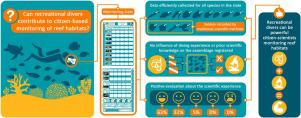Perspectives in Ecology and Conservation ( IF 4.7 ) Pub Date : 2020-01-27 , DOI: 10.1016/j.pecon.2019.12.001 Edson Aparecido Vieira , Leonardo Rodrigues de Souza , Guilherme Ortigara Longo

|
Overfishing, pollution and global changes threaten reef ecosystems all over the world and several conservation actions emerged to reduce and mitigate such impacts. Citizen-based programs with hands-on conservation experience and voluntarily data collection are a successful way of involving society in the conservation process. We developed and tested a citizen-based monitoring protocol to monitor reef fish and sea turtles during regular recreational diving operations, with minimum impact on the routine of the diving company. We compared data collected by volunteer divers and by trained scientists using this protocol, and assessed the influence of the volunteers´ diving experience in data collection. We found that recreational divers were able to record all the species included in the monitoring slate, providing estimates of species abundance and composition that did not differ from those obtained by trained scientific divers using the same protocol. This method also recorded large reef species, such as rays, sharks and turtles more effectively in comparison to traditional scientific surveys conducted in the same area. Such difference indicates complementarity between the citizen-based monitoring protocol and traditional scientific monitoring methods. The diving experience of recreational divers did not affect their ability to characterize reef assemblages and most volunteers provided a positive feedback of their experience as citizen-scientists. Therefore, recreational divers can be powerful citizen-scientists and implementing similar monitoring protocols in reef areas, particularly in marine protected areas where diving activities are allowed and regulated, seems feasible and a good way to engage divers in data collection and marine conservation.
中文翻译:

深入科学与自然保护:休闲潜水员可以监控礁石组合
过度捕捞,污染和全球变化威胁着全世界的珊瑚礁生态系统,因此出现了一些保护行动,以减少和减轻这种影响。具有动手保护经验并自愿收集数据的基于公民的计划是使社会参与保护过程的成功方法。我们开发并测试了一种基于公民的监视协议,可以在常规的休闲潜水操作中监视珊瑚鱼和海龟,对潜水公司的日常活动影响最小。我们比较了使用该协议的志愿者潜水员和训练有素的科学家收集的数据,并评估了志愿者的潜水经历对数据收集的影响。我们发现娱乐潜水员能够记录监测名单中包括的所有物种,提供的物种丰度和组成的估算与使用相同协议的受过训练的科学潜水员获得的估算没有差异。与在同一地区进行的传统科学调查相比,该方法还更有效地记录了大型礁石物种,例如射线,鲨鱼和海龟。这种差异表明基于公民的监视协议与传统科学监视方法之间的互补性。休闲潜水员的潜水经历并没有影响他们表征礁石组合的能力,大多数志愿者对他们作为公民科学家的经历提供了积极的反馈。因此,休闲潜水员可以成为强大的公民科学家,并在珊瑚礁地区实施类似的监控协议,



























 京公网安备 11010802027423号
京公网安备 11010802027423号